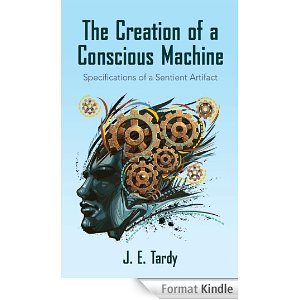Conscience
Return to Major concepts. See beings, human.

Tardy, one of the most recent authors about this issue According to Amazon "Jean E. Tardy is a technology expert. His interest in Artificial Intelligence dates back many years. He was among the first to identify natural selection as a valuable AI technique. Jean Tardy published a modern apology of the Christian Doctrine. He is currently developing the blueprint of a conscious machine.
This vast issue lies perhaps beyond the limits of art criticism, and more so for digital art. But of matters for some digital artists (for example Alain Bittler), who set conscience as the plinth of any artistic creation. It matters also for many people who wonder if and where will stop the progress of computer intelligence. So let's try to draw some lines.
We meet three attitudes.
1. Spiritualists non-reductionists. For them conscience, and the human mind in general, cannot and will never be reduced to a machine or to a formal description. They are generally spiritualists and dualists (there are real beings independently of matter). They are frequently believers.
2. Reductionists (or "materialists", somehow), who think that conscience has biological bases in brain structures and life in general. They note that conscience is not a human exclusivity, but belongs also to animals, at least the superior ones. They see favorably the developments of artificial intelligence, and tend to believe that someday wil come with computers more intelligent (then conscious) than humans (transhumanists).
3. Experimental and factual minds, who do not settle the issue, but find that this research topic is fertile, fascinating, and motivating for some forms of artistic creation.
We tend to think that, at present at least, no machine can reasonably be thought as conscience, even though some of them give us this impression at times.
To avoid some difficulties met around this issue to develop some concepts (like intention, for example), we think that conscience can be let aside (at least temporarily) and these concepts be used (in quotation marks if necessary) as far as they can efficiently be modeled in formal systems.
In some cases, the raster/code couple that we describe in our form notice may help to work creatively without dissipating the fascination and mystery, notably about continuity and infinity.
Some references
< Un automate qui se connait lui-même. Article in Scientific American (24/2/2011).
< The Creation of a Conscious Machine: Specifications of a Conscious Artifact. par J.E. Tardy. Monterège c. 2010.
< Self comes to mind. Constructing the conscious brain. by Antonio Damasio. Pantheon books 2010.
< Le Code de la conscience. by Stanislas Dehaene. 0dile Jacob 2009-2013
< The quest for
consciousness. A neurobiological approach.by Christoph Koch. Robert,
Englewood CO, 2004)
< Modéliser et concevoir une
machine pensante, by Alain Cardon (Edition des automte
intelligents) AH No 124 (biblio)
< Vers une étude objective de la conscience. by François Anceau. Hermès Science 1999
< Conscience artificielle et systèmes adaptatifs. by
Alain Cardon. Eyrolles (?) 1999
< Matière et conscience. by M. Churchland. Champs Vallon 1999.
< Sentiment même de soi: corps, émotions, conscience. by Antonio Damasio. Odile Jacob 1999.
< The mystery
of consciousness. by John Searle. Granta Books 1997.
< The conscious mind, in search of a fundamental theory. by David Chalmers. Oxford university press 1996.
< Les ombres de l'esprit. A la recherche d'une
science de la conscience. by Roger Penrose. InterEditions 1995.
< Computer
Simulation of Personality. Frontier of Psychological Theory. by Silvan Tomkins
and Samuel Messick. Wiley and sons, 1963.
< Paradoxes de la conscience et limites de l'automatisme. by Raymond Ruyer. Albin Michel, 1956.
- More references (up to 2005) in the Intelligence artificielle item of Dictionnaire des Stic.
Notes on April 21, 2024
- "A note about animals conscience. - La définition donnée n’est pas bien claire «An organism has conscious mental states if and only there is Something that its like to be that organism »… Je ne comprends pas bien. Sur conscience et IA, la conclusion est modeste et rejoint la mienne « Current AI systems are very unlikely to be conscious », Sebo said, what he’s learned about animal minds « does give me pause and makes me want to approach the topic with caution and humility ». J’avais fait le point il y a quelque quinze ans dans diccan http://diccan.com/Conscience_Eng.html Depuis j’ai noté qu’un chercheur de l’université de Cergy avait montré qu’une mahine pouvait passer le test du « moi ».- The Tardy's book is severely rated on the web, and I find no further developments.